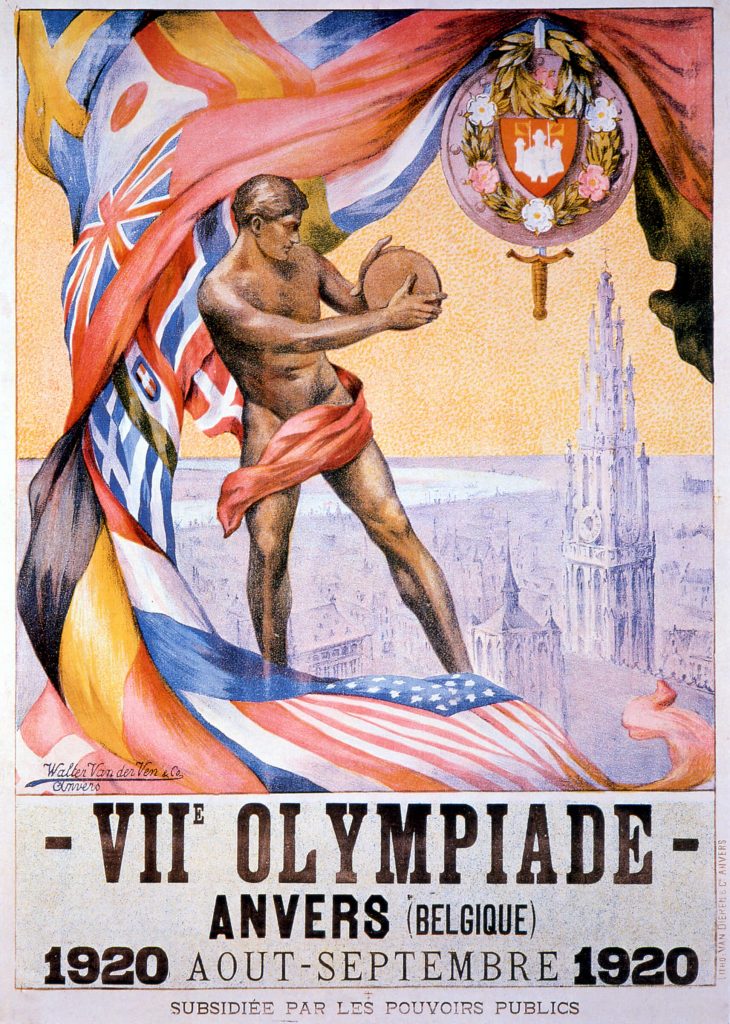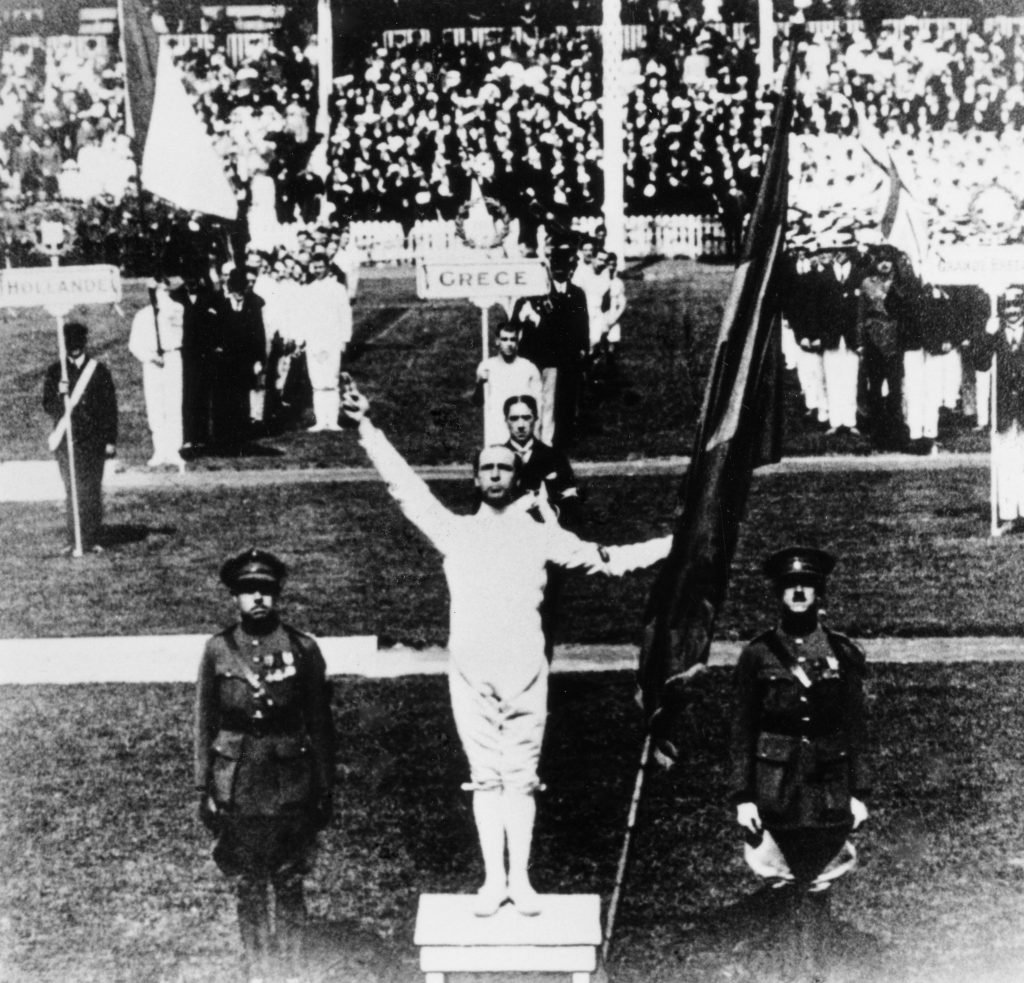Stories from Past Olympics and Paralympics - 2The ‘Spanish flu’ and the Antwerp Games

The Games of the VII Olympiad were held exactly 100 years ago, in 1920 in Antwerp, Belgium. The world at that time, including Japan, looked quite similar to the world today. The 1918 flu pandemic, also known as the Spanish flu, was rampant. While the World Health Organization declared the spread of the new coronavirus to be a pandemic in March of this year, the Spanish flu was one of the worst pandemics in human history.
One of the worst pandemics in human history
The pandemic began in the spring of 1918, with a second wave from the summer through fall and a third wave in the spring of 1919, before finally ending. According to the historical demographer Akira Hayami (The Spanish Flu that Struck Japan; Fujiwara Shoten, 2006), roughly 500 million people, corresponding to 30% of the world’s population at the time, were infected, and 45 million people died. The flu reached Japan roughly six months later, infecting 23 million people, or half the population, and 450,000 people are estimated to have died.
According to newspaper reports at the time, countermeasures were similar to those being seen today, including quarantining infected persons, avoiding crowded spaces, wearing face masks, school closures, and event cancellations. Against this backdrop, why were the Olympics held in Antwerp?
Belgium was considered a country that had miraculously escaped the pandemic. Although there is no clear evidence, Japanese government records from the time do not include Belgium as a country that was infected, but the entry for Germany does include the first character used to write “Belgium.” Although many other countries, including France, Spain, Italy, the Netherlands, Portugal, Britain, and the United States are listed, Belgium’s absence could be significant.
World War I also cast a shadow
The shadow cast on Belgium by World War I was in fact greater than that of the pandemic. The war was triggered by the June 28, 1914, assassination of Archduke Franz Ferdinand of Austria-Hungary, which led to Austria-Hungary declaring war on Serbia on July 28. Serbia was backed by Russia, which mobilized on Serbia’s behalf. Austria-Hungary was allied with Germany, while Russia was allied with France and Britain, and all of these countries successively become involved in the war, which spread across Europe.
Belgium was neutral, but Germany ignored this fact and invaded the country, and Belgium subsequently suffered major damage under German occupation. The war ended on November 11, 1918. The Games of the VI Olympiad, which were scheduled to be held in Berlin in 1916, had been canceled.
As the war spread, the International Olympic Committee underwent changes. Its headquarters was moved from Paris to Lausanne, in neutral Switzerland, and its president, Pierre de Coubertin, volunteered for service in the French military. Whether because of his pride from having been raised in a noble family and educated in military schools, or that his books were forbidden from being sold because they were deemed anti-war, or he became despondent because the concept of “peace through the Olympics” had failed, he resigned with the belief that the IOC should not be led by a soldier, and named Godefroy de Blonay acting president, and Blonay served in that role until the war ended.
Looking to the Olympics for peace and reconstruction
Coubertin was reinstated as president of the IOC in March 1919 and convened a meeting of the committee in Lausanne, where the decision was made to restart the Olympics in 1920 in Antwerp. The decision to hold the games in Antwerp had been made before the start of the war, and although the city had suffered much damage it was largely spared from the influenza pandemic, and positive signs of recovery were beginning to appear.
On August 14, 1920, King Albert I declared the Games open at a just-finished Olympic Stadium, with 2607 athletes from 29 countries participating, both record numbers at the time. The Olympic Flag, featuring five interlocking rings of different colors against a white background, which had been designed by Coubertin and manufactured at Le Bon Marché department store in Paris in 1914, was flown for the first time. The Olympic Oath was also recited for the first time, by the Belgian fencer Victor Boin. The spectacle sent a message of peace and reconstruction to the rest of the world.
This is why the 1920 Games are referred to as a “successful Olympics.” This is only a superficial assessment, however. In reality, with only one year to prepare and strained finances, many of the venues were not completed. A lack of advertising also meant few spectators and a lack of enthusiasm. It was, however, a Games in which the IOC made an impression.


What does all of this mean for the 2020 Tokyo Olympics, set to begin in July 2021?
We cannot be sure the Games can be held unless the pandemic is brought under control. Another postponement is unlikely, and the world is waiting anxiously for the situation to return to normal as quickly as possible.
We continue to battle the new coronavirus. Doctors, nurses, and other health care workers are putting their lives on the line, and in addition to national and local government measures, cooperation from the corporate world will be needed as well. The Nippon Foundation has built a facility for people with moderate infections at the Museum of Maritime Science in Odaiba, Tokyo, and is providing financial support for its operation. Although staying home is an inconvenience, as individuals it is the very least we can do.
Contact
Public Relations Team
The Nippon Foundation
- Email: cc@ps.nippon-foundation.or.jp



